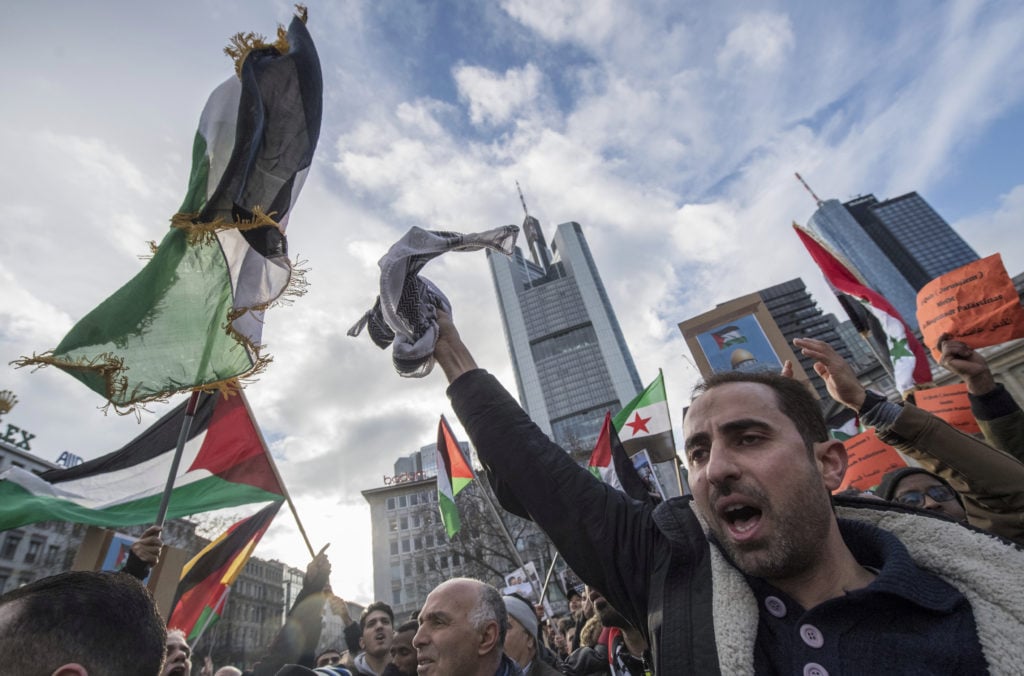Josef Schuster, president of the Central Council of German Jews, will deliver his speech in commemoration of the 85th anniversary of Reichspogromnacht — the nationwide Nazi assault on the German Jewish community in 1938 and also warns of dark days to come.
By Ben Cohen, The Algemeiner
The head of Germany’s Jewish community will say in a speech on Thursday night that he cannot rule out the possibility of a mob attack on Jews reminiscent of the recent violent scenes at an airport in Dagestan, Russia, following the arrival of a plane from Israel.
Josef Schuster, president of the Central Council of German Jews, will deliver his speech at a special commemoration for the 85th anniversary of Reichspogromnacht — the nationwide Nazi assault on the German Jewish community on Nov. 9-10, 1938 — at Berlin’s Beth Zion synagogue. Also addressing the event are Olaf Scholz, Germany’s chancellor, and Frank-Walter Steinmeier, the country’s president.
In his speech, an advance copy of which was shared with The Algemeiner, Schuster will highlight the parallels between the Nazi orgy of antisemitic violence in 1938 and the assault on southern Israel by Hamas terrorists on Oct. 7, in which more than 1,400 people were murdered.
“I could talk about November 9, 1938,” Schuster will say. “But I could also talk about the pogrom of our time, the cruel terror of Hamas on Oct. 7, 2023. The descriptions are similar.”
At the heart of Schuster’s speech is the growing concern over rising antisemitism in Germany, with more than 2,000 incidents targeting Jews recorded since Oct. 7, according to data from the Federal Criminal Police Office released last week. The explosion of violence and harassment has highlighted the prevalence of antisemitic attitudes among Germany’s Muslim communities, who have staged angry demonstrations in support of Hamas in several cities during the last month.
“The images from Dagestan seem far away. Or not?” Schuster will ask. While acknowledging that the federal republic that rose from the ashes of the Nazi regime has made the protection of Jewish life a central mission, he will argue that incitement on social media nonetheless poses the risk of extreme violence.
“Is it not conceivable that such a hunt for Jews could take place in such a way? That this framework also exists in Germany? A mob incited by fanatics openly inciting hatred on TikTok, Telegram?” Schuster will say. “Five weeks ago, I would have said that I can’t imagine that, but today I am not so sure.”
German politicians meanwhile have continued to express anguish over the increase in antisemitic outrages. On Tuesday, a spokesperson for the interior ministry told the Handelsblatt news outlet that attacks on Jewish institutions “cannot be ruled out,” pledging to fight the “evil” of Islamism in accordance with the “rule of law.”
The Reichspogromnacht commemorations across Germany coincide with the publication of a new report on antisemitism published by the Antonio Amadeu Foundation, a leading anti-racist organization. The report emphasizes that Germany’s culture of Holocaust commemoration is being actively attacked by Islamist, far right, and extreme left organizations comparing Israel’s defensive actions in Gaza with the Nazi atrocities. It pointed out that far right groups have eagerly exploited the renewed conflict in Gaza, citing incidents of Holocaust memorials being vandalized with stickers declaring “Get rid of the [Holocaust] guilt cult: Free Palestine” and “Israel murders while the world watches.”
Known for most of the post-war period as “Kristallnacht” — the “Night of the Broken Glass” — the Nov. 9-10, 1938 Nazi pogrom resulted in the deaths of more than 100 Jews, the burning of hundreds of synagogues, the looting of over 7,000 Jewish-owned stores, and the arrest of 30,000 Jewish men, most of whom were deported to concentration camps. In recent years, historians have used the term “Reichspogromnacht” — “Reich pogrom night” — instead of “Kristallnacht,” arguing that it better captures the nature of the violence.


